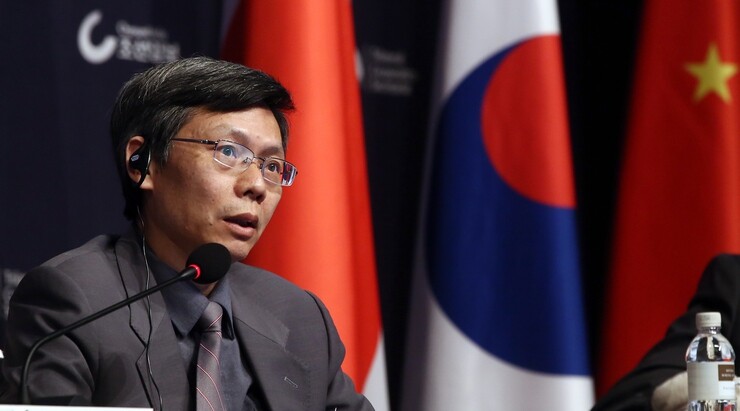hankyoreh
Links to other country sites 다른 나라 사이트 링크
[Interview] Chinese expert says that Moon-Xi summit symbolizes “a time of change”

Zhang Xiaoming, a professor of international relations at Peking University’s School of International Studies, said that the meeting between South Korean President Moon Jae-in and Chinese President Xi Jinping was itself a symbol of a “time of change” in South Korea-China relations. In a telephone interview with the Hankyoreh on Nov. 13, Zhang, a scholar of China’s relations with its neighbors and great power relations, concluded that, contrary to expectations, US-China relations have become stable since the inauguration of US President Donald Trump.
Hankyoreh (Hani): South Koreans were expecting a lot from the South Korea-China summit, but President Xi reconfirmed China’s position of adamant opposition on the THAAD issue. What does that mean?
Zhang Xiaoming (Zhang): China’s position on the THAAD issue has never changed, and there’s no way it would suddenly change now. The THAAD issue still stands between South Korea and China. The two countries’ positions were supposedly reconciled through an agreement on Oct. 31, but China is still watching. However, the two countries carried out dialogue on foreign policy and military matters, and they will do the same in the future.
Hani: Does that mean we can’t expect a complete restoration of bilateral relations for the time being?
Zhang: President Moon met President Xi first in Germany and then in Vietnam, too, didn’t he? That would have been unimaginable in the past, when bilateral relations were poor. A “time of change” has already begun for South Korea-China relations. But even if relations are restored, a complete return to the past does not appear possible. But things will be better than they were last year or the beginning of this year.
Hani: What impression did you get of President Trump’s visit to China?
Zhang: It was much better than I expected. I didn’t expect that deals worth more than US$250 billion would be reached in the areas of the economy and trade. Based on what has been made public thus far, I don’t think that communication between President Xi and President Trump went that poorly.
Hani: There was no major progress on their positions on the North Korean nuclear issue.
Zhang: When it comes to the North Korean nuclear issue, there’s little disagreement between China and the US on their shared view that the North cannot be recognized as a nuclear power state and that it must denuclearize. The peaceable solution that China desires is also shared by South Korea and other neighbors. Furthermore, China has voted in favor of all the UN Security Council’s sanctions resolutions against North Korea, which have gradually become tougher. China is not opposed to putting pressure on North Korea. But in order to reach a breakthrough, there ultimately must be direct dialogue between North Korea and the US.
Hani: It’s widely thought that the Indo-Pacific doctrine (the so-called “Free and Open Indo-Pacific” strategy) that President Trump has mentioned recently is designed to counter China.
Zhang: “Indo-Pacific” is nothing new – it was also used under President Barack Obama and as far back as the 1920s. To be sure, strengthening US-India relations is on some level designed to counter China. But in contrast to the concerns voiced by many people before President Trump took office, since his inauguration China-US relations have ended up moving toward stability.
By Kim Oi-hyun, Beijing correspondent
Please direct questions or comments to [english@hani.co.kr]

Editorial・opinion
![[Column] Park Geun-hye déjà vu in Yoon Suk-yeol [Column] Park Geun-hye déjà vu in Yoon Suk-yeol](https://flexible.img.hani.co.kr/flexible/normal/500/300/imgdb/original/2024/0424/651713945113788.jpg) [Column] Park Geun-hye déjà vu in Yoon Suk-yeol
[Column] Park Geun-hye déjà vu in Yoon Suk-yeol![[Editorial] New weight of N. Korea’s nuclear threats makes dialogue all the more urgent [Editorial] New weight of N. Korea’s nuclear threats makes dialogue all the more urgent](https://flexible.img.hani.co.kr/flexible/normal/500/300/imgdb/original/2024/0424/7317139454662664.jpg) [Editorial] New weight of N. Korea’s nuclear threats makes dialogue all the more urgent
[Editorial] New weight of N. Korea’s nuclear threats makes dialogue all the more urgent- [Guest essay] The real reason Korea’s new right wants to dub Rhee a founding father
- [Column] ‘Choson’: Is it time we start referring to N. Korea in its own terms?
- [Editorial] Japan’s rewriting of history with Korea has gone too far
- [Column] The president’s questionable capacity for dialogue
- [Column] Are chaebol firms just pizza pies for families to divvy up as they please?
- [Column] Has Korea, too, crossed the Rubicon on China?
- [Correspondent’s column] In Japan’s alliance with US, echoes of its past alliances with UK
- [Editorial] Does Yoon think the Korean public is wrong?
Most viewed articles
- 1‘We must say no’: Seoul defense chief on Korean, USFK involvement in hypothetical Taiwan crisis
- 2Will NewJeans end up collateral damage in internal feud at K-pop juggernaut Hybe?
- 3[Column] Park Geun-hye déjà vu in Yoon Suk-yeol
- 4Why Korea shouldn’t welcome Japan’s newly beefed up defense cooperation with US
- 5Thursday to mark start of resignations by senior doctors amid standoff with government
- 6N. Korean hackers breached 10 defense contractors in South for months, police say
- 7[Guest essay] The real reason Korea’s new right wants to dub Rhee a founding father
- 8[Column] ‘Choson’: Is it time we start referring to N. Korea in its own terms?
- 9Kim Jong-un expressed ‘satisfaction’ with nuclear counterstrike drill directed at South
- 10[Editorial] New weight of N. Korea’s nuclear threats makes dialogue all the more urgent